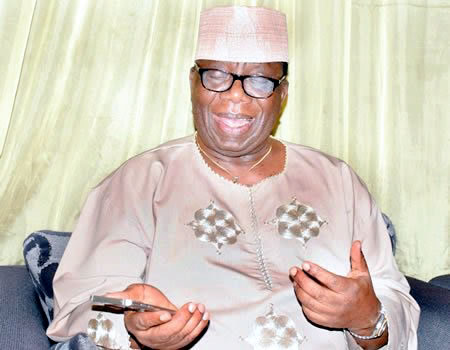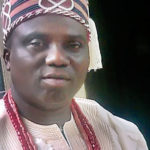An engineer, Mr Layi Ajayi-Bembe, is one of the offsprings of Ajayi Bembe, the eighth Obanikoro of Lagos, who ruled between 1897 and 1906. In this interview, the octogenarian and former president of the Association of Lagos State Indigenes takes AKIN ADEWAKUN and SEGUN KASALI down memory lane concerning pre-independence Lagos, its administration, and the issues of Lagos citizenship.
You were once president of the Association of Lagos State Indigenes and even served in that capacity for 14 years. Why the association?
It was formed by a consensus. It was just like we normally say it in Lagos parlance “a mo ra wa” (we know one another). So, everybody seems to know themselves, I mean the authentic indigenes of Lagos. Don’t forget that this association is an amalgam of so many groups, in Lagos, Ibile, Isale Eko Descendants Union, Epe Development Association and others. We were all involved in forming the association. And we had our reasons for coming up with the association.
Reps Speakership: 156 members-elect endorse Bago for Speaker
There are insinuations that one of such reasons the association was formed is to discriminate against non-indigenes?
Not, at all. The association was not formed to oppose the people coming to Lagos and even living in Lagos. Everybody is free to do whatever they like. It is a city that welcomes all and sundry.
But we discovered that this hospitality of the people and the city was being taken for granted. We discovered that the real citizens, the indigenes of this place are being taken out of the system. For instance, most appointments, both at the federal and state level are not coming to the indigenes of Lagos. The appointments were not being done on quota system, hence the association. So, the association was formed to address these gaps. It was formed with the aim of looking into all these and making sure that what is due to indigenes of Lagos are given to them. I will give you an example. There was a time they were appointing ambassadors and Lagos was being given a slot. Former President Olusegun Obasanjo, who was at the helm of affairs at that time, decided to pick someone from Ijebu to represent Lagos. We complained and he asked us to go to court. Can you imagine such injustice? So the association was formed to give voice to the indigenes of Lagos.
You said the association was formed to ensure Lagos indigenes get what is due to them. Would you say this very important objective of the association is being achieved?
No. Absolutely, no. Since 1969, we have always been meeting stiff opposition. Unfortunately, the ruling party in the state has not been kind to Lagos, I mean the indigenes, at all. But if they think they can get away with it, they are mistaken.
How does one qualify for the membership of the association considering the fact that this is a city that throws its doors open to everyone, and anybody living in Lagos can claim eligibility?
I won’t say anybody that lives here can claim eligibility. We have a way of determining who is qualified and who is not. For instance, the association has chapters in Ikorodu, Epe, Badagry and other places, within the state. Each chapter knows its members, and they also have a way of determining the eligibility of anybody that wants to join. So, it is not everybody that can be regarded as members. So, it is the chapters that meet and send representatives to the head office. I mean they know themselves. It is also the chapters that converge to elect the officials of the association. You must be an indigene to qualify for membership.
There are insinuations that the association is meant to sever cultural links with the Yoruba people and pledge members’ allegiance to the Benin culture, where they claim to come from. Does this not defeat the integration scheme the whole of the South Western states are clamouring for?
That is not true. We have seen and heard a lot, concerning Lagos, being a no-man’s land. It is very unfortunate. I have read the views of so many people, including that of Olusi about Awori. Unfortunately, what he said is not true at all. I think Erelu too wrote some article, concerning this. You see, there is no way we can sever links with the Yoruba. What we are doing in the association is to talk about the first settlers in Lagos, their culture and press for what is due to them. It is to actually ensure that the history of the original Lagos is kept intact. For instance, some of us have had our ancestors coming from Benin that is why in Iga Idunganran, the main language is Benin language, the same thing in Idumota and many other places, in the state. We are talking about the cultural beginning of Lagos, our Benin ancestors and the fact that we still respect them.
No doubt, we welcome the Yoruba groups who are here as long as we are treated equally, I mean like every other persons or group in the state. I don’t know why we should not be given what is due to us, considering the fact that we are the indigenes here. No other place in the country is this done, and you can quote me on this: in Ogun , the nearest state to us, you hardly find an indigene of Lagos looking for job in Ogun State and getting it, which is very unfortunate.
Lagos is being treated with levity and it is sad that some people, who we know where they hail from will sit down and say we own Lagos. So, this is the problem.
Since Lagos belongs to its indigenes, as against the general statement that it’s a no man’s land, what are its distinct cultural values, then?
Lagos has become cosmopolitan. It’s now a blend of different cultures and values. Come to Popo Aguda, you will see the descendants of the Brazilians. Come to Isale Eko, you will find out that they are more like Benin people; the Gbedus, the Obanikoros. These are all Benin descendants. Go to Epe, there are a lot of Ijebu import. Don’t forget that Epe was under the sovereignty of Awujale of Ijebu land up till 1865 when Kosoko was moving out of Lagos, trying to get permission from Awujale to settle in Epe. Kosoko would have become the first prince of Lagos that was exiled to Epe because of his crime with Prince Akintoye. So, now look at it this way — these cultures meet, mix and interact. So, you cannot say this is the culture of Lagos.
Can you give us an insight into what Lagos looked like then, especially in the days of your granddad, the eighth Obanikoro of Lagos?
My granddad’s name was Ajayi-Bembe. He was the Obanikoro between 1897 and 1906. He was very critical about the life of the nation. There was no Nigeria then. So, they had their own method of administration. The Obanikoro seat had been vacant for almost 19 years before he ascended the throne. At that time, I can tell you this: there were no first class chiefs; there were no second class chiefs and there were no third class chiefs. Those were not there until 1932 when a commission was set up to enquire into the succession of obas in Lagos.
My grandfather was a trader. I remember the first time the Ooni of Ife came to Lagos to adjudicate on who should wear the crown. He was one of the people at the meeting and the curious thing, then, was that no oba in Yorubaland dared look at the Ooni in the face. Ooni came to Lagos and decided on who should wear the crown and there was respect among the obas then. And again, what I want to emphasise is this, the oba title was only peculiar to Benin at that time.
This was the tradition. But, now, there are more obas in Lagos than the citizens themselves. Everybody wants to be an oba and everybody wants to be a chief. This is what I have resisted all along. My nephew is the 12th Obanikoro of Lagos now. When you look at that seat, it has evolved. He came from Idu-Oluwole, which is from Badagry and now came back to Lagos. Ido-Ishagbe was pure Benin because Ishagbe was the area they worshipped their idols, then, same thing with Idumota. My grandfather was powerful, and he did something which benefitted a whole lot of us. All his wives were educated. They were able to put down all the dates of the events that happened. Obviously, by the time he was gone, Christianity had come in 1861. Don’t forget that Islam had been in Lagos before Christianity. Islam was in Lagos 150 years before Christianity. From the story we were told, the first laws in Lagos were given by the Obanikoro, and they are still there. There was no problem between the Muslims and Christians. My mother was a Muslim and my father was a Christian. There was no difference at all. No Lagosian would discriminate then on the basis of religion. The Muslims were there; the Christians were there, and they mixed freely.






